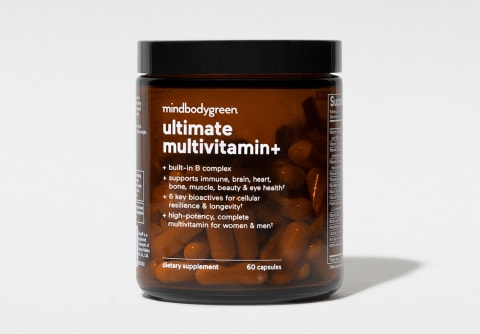Advertisement
This Is The Best (And Worst) Time Of Day To Take Your Multivitamin, Say Experts


Ashley Jordan Ferira, Ph.D., RDN is Vice President of Scientific Affairs at mindbodygreen. She received her bachelor's degree in Biological Basis of Behavior from the University of Pennsylvania and Ph.D. in Foods and Nutrition from the University of Georgia.
A multivitamin might seem like the most basic supplement in the book—but just because you've been taking a multi for as long as you can remember (those chewable dinosaurs were chalky) doesn't necessarily mean you're doing it right or that your decades-long approach couldn't use some fine-tuning.
Yep, folks, there is a little more to a multivitamin routine than simply popping those capsules or tablets whenever you remember and hoping for the best.
If you're wondering when the best time to take your multivitamin actually is (and why!), look no further.
Consider this your complete guide to optimizing your multivitamin regimen so that you get the most benefits out of your efforts.*
Why should you take a multivitamin?
If you think you've got your nutrient bases covered with your diet alone, well, don't be so sure. The numbers tell a different story!
Remember, these are essential micronutrients your body needs daily for optimal health and functioning.*
That's exactly why dietitian Keri Gans, R.D., author of The Small Change Diet, recommends thinking of multivitamins "as a safety net or insurance policy" for meeting your nutritional needs on the daily.*
"We all should try and get our nutrition from whole foods first, but sometimes we fall short and a multivitamin may be helpful," she says.
While your doctor or a dietitian can help you pinpoint some of the specific nutrient gaps you might be facing that warrant adding a multivitamin to your routine, certain groups of people are especially likely to benefit from one.
People with food sensitivities or dietary restrictions that involve limiting certain food groups like dairy, animal proteins, and gluten-containing grains, as well as those with GI challenges, often really need the support a multivitamin offers, according to Bethany Doerfler, RDN, a clinical research dietitian at Northwestern Memorial Hospital. "I use a lot of multivitamins in my practice," she says.
Summary
When is the best time to take a multivitamin?
To understand the ideal time to pop your multivitamin, you first have to understand the different types of nutrients your multivitamin contains.
One major consideration: fat-soluble vitamins, which are better absorbed in your body when you take them food, points out Jessica Cording, M.S., R.D., dietitian and author of The Little Book of Game-Changers.
"Because multivitamins do typically contain fat-soluble vitamins—which are vitamins A, D, E, and K—consuming them with a meal or snack that provides some fat enhances absorption,"* she says.
That doesn't mean you won't get some benefit if you take your multivitamin without food, but you certainly won't get as much out of it as you would if you took it with fat.*
The water-soluble vitamins your multi also likely offers (think vitamin C and those eight B vitamins), meanwhile, just need a little liquid (i.e., the water or beverage you swallowed your multi with) in order to be absorbed and do their thing. Water-soluble vitamins can be absorbed with or without food.
As mbg's in-house dietitian Ashley Jordan Ferira, Ph.D., RDN, explains, "In a multi, the fat-soluble vitamins—and by the way, any other fat-soluble compounds a specialized multivitamin may include—are the 'limiting factor' or primary consideration when it comes to timing, necessitating proximity to some fat content for optimal absorption."
So, to strike a balance that best supports the absorption of all the goodness in your multivitamin/mineral supplement, Cording recommends taking it with a meal or even just a little food, like a scoop of nut butter, and a glass of water.
As for whether to take your multivitamin in the morning or at night? That ultimately comes down to personal preference, although some experts recommend opting for the a.m.
"In general, most people are more likely to stick with taking a multivitamin first thing in the morning," Doerfler says.
This way, the twists and turns your day takes don't get in the way of you sticking to your routine.
Summary
What is the worst time to take a multivitamin?
For many people, the only wrong time to pop that multivitamin is on an empty stomach, especially if they tend to have a sensitive system.
"Sometimes, taking a multivitamin can upset someone's stomach if they take it without food," says Jamie Alan, Ph.D., an associate professor of pharmacology and toxicology at Michigan State University.
Ferira concurs with this important caveat: "For some people, the morning is simply not an ideal time to take their multivitamin because some individuals' stomachs can't tolerate such a hefty mineral load in the initial hours of the day. I know I can't. Personalized nutrition honors these individual differences and pivots one's approach. For me, my daily multi is taken every day with my lunch."
Vitamin C, iron, zinc, and other minerals, in particular, can be harsh for an empty GI system to process. (This is exactly why mbg formulated our ultimate multivitamin+ with premium mineral forms (e.g., chelated, bioavailable forms of iron, zinc, etc.): to ensure they're gentle on your stomach and absorbed as effectively as possible.*
One other consideration: Some vitamins, like vitamin B123, can have an energizing effect in some people and therefore have the potential to interfere with your sleep, Alan says.*
If you notice that taking your multivitamin later in the day leaves you staring at the ceiling come bedtime, try switching your routine to the morning or midday, she suggests.
Summary
The takeaway
A high-quality daily multivitamin is a simple and strategic way to fill any nutritional gaps in your diet (which are numerous per the latest science).
While the best time to take your multivitamin is ultimately the time you'll remember to take it, experts generally agree that in the morning or midday—and with a little food—is a safe bet.
For more targeted vitamin recommendations, check out our guides to probiotics, collagen, and skin and liver supporting supplements.
RELATED STORY: How To Choose The Right Multivitamin To Support Your Health
Watch Next
Enjoy some of our favorite clips from classes
Enjoy some of our favorite clips from classes
What Is Meditation?
Mindfulness/Spirituality | Light Watkins
Box Breathing
Mindfulness/Spirituality | Gwen Dittmar
What Breathwork Can Address
Mindfulness/Spirituality | Gwen Dittmar
The 8 Limbs of Yoga - What is Asana?
Yoga | Caley Alyssa
Two Standing Postures to Open Up Tight Hips
Yoga | Caley Alyssa
How Plants Can Optimize Athletic Performance
Nutrition | Rich Roll
What to Eat Before a Workout
Nutrition | Rich Roll
How Ayurveda Helps Us Navigate Modern Life
Nutrition | Sahara Rose
Messages About Love & Relationships
Love & Relationships | Esther Perel
Love Languages
Love & Relationships | Esther Perel
What Is Meditation?
Box Breathing
What Breathwork Can Address
The 8 Limbs of Yoga - What is Asana?
Two Standing Postures to Open Up Tight Hips
How Plants Can Optimize Athletic Performance
What to Eat Before a Workout
How Ayurveda Helps Us Navigate Modern Life
Messages About Love & Relationships
Love Languages
Advertisement

This Little-Known Supplement Helps Women Sleep & Decreases Signs Of Depression
Molly Knudsen, M.S., RDN

This Little-Known Supplement Helps Women Sleep & Decreases Signs Of Depression
Molly Knudsen, M.S., RDN
















